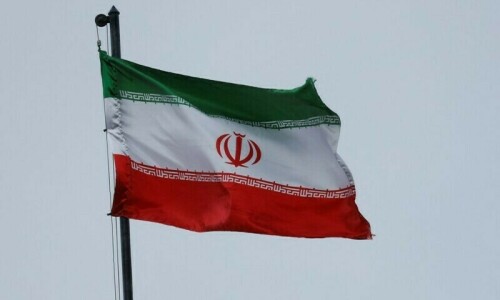IBA Karachi cancels Dr Atif Mian's lecture after 'threats from extremists'

The Institute of Business Administration (IBA) Karachi has cancelled a scheduled online seminar that was to feature celebrated economist Dr Atif Mian, the university announced on Thursday, allegedly due to pressure by "extremists".
"Dr Atif R. Mian’s lecture 'Why has economic growth fallen behind in Pakistan?' scheduled on November 5, 2020, has been cancelled. Inconvenience is highly regretted," read a brief post by the IBA Karachi's official Twitter account.
In a tweet, Mian said he was sorry to report that the seminar, which was to take place over Zoom, had been cancelled "due to threats that the university administration was facing from extremists".
Read op-ed by Atif Mian: Fixing Pakistan’s financial woes
"My very best wishes and prayers are with the students of IBA," the Princeton University economist wrote.
A spokesperson for IBA Karachi declined to comment when approached by Dawn.com.
Dr Mian became a widely discussed name in Pakistan in 2018 after the PTI government appointed him to the Prime Minister Imran Khan-led Economic Advisory Council (EAC), an 18-member panel set up to advise the newly-formed government on economic policy.
Less than a month after taking office, however, the government asked Mian to step down from the EAC amid mounting pressure from religio-political parties and a smear campaign launched on social media seeking his removal over his Ahmadiyya faith.
See: Atif Mian and the kingdom of clowns
In protest over Mian's exclusion, two other EAC members — Prof Dr Asim Ijaz Khwaja of the Harvard Kennedy School and London-based economist Dr Imran Rasul — had also resigned from the council.
Dr Mian has served as a professor of economics, public policy and finance at Princeton University and as director of The Julis-Rabinowitz Centre for Public Policy and Finance at Woodrow Wilson School. He is the only Pakistani to be considered among the International Monetary Fund’s ‘top 25 brightest young economists’.
Ahmadis were declared non-Muslims in Pakistan through a constitutional amendment passed on September 7, 1974, during the tenure of Zulfikar Ali Bhutto.
This measure was later followed with Gen Ziaul Haq making it a punishable offence for Ahmadis to call themselves Muslim or to refer to their faith as Islam.
'An opportunity lost'
Academics, journalists and others expressed regret over the cancellation of Mian's lecture at IBA Karachi.
"So terrible. What a loss! We are all hostages," wrote sociologist and academic Nida Kirmani in a tweet.
In a message of support, US-based political science professor Adnan Rasool termed Mian "a graceful and patient man".
"You have shown more poise in the face [of] hate than most would ever in their lifetime," he said.
Wendy Gilmour, Canada’s high commissioner to Pakistan, said the development was "an opportunity lost for the students and wider interested community".
Journalist Zarrar Khuhro questioned why the university had arranged the Atif Mian lecture in the first place, saying it was "not rocket science" to predict that the programme would receive a backlash.
"Why do it if you cannot withstand pressure?" he wrote.
















































